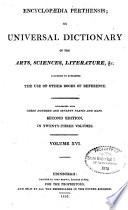 | Thomas Taylor - Philosophy, Ancient - 1812 - 622 pages
...is false ; viz. " That every body perseveres in its state of rest, or of uniform motion in a right line, unless it is compelled to change that state by forces impressed upon it." For, on the contrary, if a body is moved in a direction contrary to its natural tendency, it endeavours... | |
 | Encyclopedias and dictionaries - 1816 - 778 pages
...axioms or laws of motion. i. EVERY BODY PERSEVERES IN ITS STATE OF REST, OR OF UNIFORM MOTION IN A RIGHT LINE, UNLESS IT IS COMPELLED TO CHANGE THAT STATE BY FORCES IMPRESSED UPON IT. — Sir Ifaac's proof of this axiom is as follows : " Projectiles perfevere in their motions, fo far... | |
 | Thomas Keith - Astronomy - 1819 - 380 pages
...LAWS OF MOTION. LAW I.—" Every body perseveres in its state of rest, " or uniform motion in a right line, unless it is " compelled to change that state by forces impressed " thereon."—Newton's Princip. Book I. Thus, when a body A is positively . x at rest, if no external... | |
 | Encyclopaedia Americana - 1831 - 610 pages
...language of Newton. I. " Every body perseveres in its state of rest, or of uniform motion in a right line, unless it is compelled to change that state by forces impressed thereon." This is called the law of inertia, and expresses the entire indifference of matter to motion... | |
 | Thomas Keith - 1848 - 486 pages
...OP MOTION. LAW I. — " Every body perseveres in its state of rest, or uniform motion in a straight line, unless it is compelled to change that state by forces impressed thereon." — Newton's Princip. Book I.* Thus, when a body A is positively at rest, if _ no external... | |
 | 1850 - 766 pages
...Natural Philosophy. 1st Uw. Every body perseveres in its slate of rest, or of uniform motion in a right line, unless it is compelled to change that state by forces impressed upon it. 2d law. The alteration of motion , ; is always proportional to the motive force impressed, and i.«... | |
 | 1850 - 772 pages
...atura! Philosophy. 1st law. Every body perseveres in its state of rest, or of uniform motion in a rieht line, unless it is compelled to change that state by forces impressed upon it. 2d law. The alteration of motion is always proportional to the motive force impressed, and is made... | |
 | Samuel Maunder - 1855 - 766 pages
...Natural Philosophy. 1st law. Every body perseveres in its state of rest, or of uniform motion in a right line, unless it is compelled to change that state by forces impressed upon it. 2d law. The alteration of motion is always proportional to ihe motive force impressed, and is made... | |
 | John William Draper - Europe - 1863 - 656 pages
...as given by Newton : (1.) Every body perseveres in its state of rest or of uniform motion in a right line unless it is compelled to change that state by forces impressed thereon. (2.) The alteration of motion is ever proportional to the motive force impressed, and is made... | |
| |